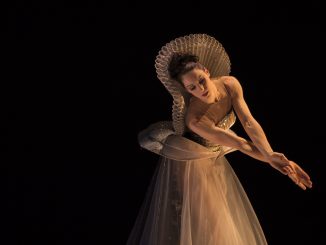
The historic Auditorium Theatre of Roosevelt University, 50 E. Ida B. Wells Drive, Chicago, played host to the 14th Anniversary program Too Hot to Handel: The Jazz-Gospel Messiah, presented in honor of the life and legacy of legendary civil rights leader and cultural hero Dr. Martin Luther King, Jr. on January 19, 2019, in a program to be repeated January 20, 2019.
After an introduction by Interim C.E.O. Rachel Freund, 7th grade student Chloe Johnson from Philip Rogers Elementary School recited her winning submission to the Too Hot to Handel poetry contest, entitled This Small Community. Created as her response to the prompt, “How has my community shaped me”, her single stanza impressive and solemn yet hopeful submission included the poignant line, “All will stand together, no one will be left”.

The rousing concert that followed was a brilliant mix of jazz, gospel, scat, blues, swing and classical with very strong solo performers, a jazz band, and a spectacular choral group as well as a full symphony orchestra presentation. It has been described as “your grandmother’s choral classic sliced, diced, spiced, swirled, swung, amplified, and totally reinvented.”
Conceived by Marin Alsop, arranged by Bob Christianson and Gary Anderson, the show featured Suzanne Mallare Acton, Artistic and Musical Director of Detroit’s Rackham Symphony Choir conducting the 50-piece Too Hot symphony orchestra and jazz ensemble, and Bill Fraher, Director of Concert Choirs, Old St. Patrick’s Church, Chicago, directing the 100-member Too Hotchoir, which includes guest choristers Rackham Symphony Choir.
This spectacular event also showcased pianist Alvin Waddles III, who thrilled the audience with his wonderful riffs leading into The Hallelujah Chorus finale, and gave ample solo time for such splendid soloists as Rajiv Halim, principal saxophone; Dave O’Fallon, principal timpani; Ruben Alvarez, principal percussion; David Taylor, drums; Marion Hayden, string bass; Alan Ayoub, electric guitar, and others.
The adapted program consisted of 26 pieces of stirring music, following and adapted from the original score, with the sold-out audience swaying rhythmically and clapping along enthusiastically.
Soloists Rodrick Dixon, tenor, his wife, Alfreda Burke, soprano, Karen Marie Richardson, alto, and special guest bass baritone David Vaughan thrilled the audience with their demonstrations of raw vocal power and emotional intensity.
Dixon outdid himself in the opening piece, Every valley shall be exalted, his fine voice swelling ecstatically and devolving into scat. Richardson and the choir were mesmerizing in O thou that tellest good tidings to Zion. Burke’s soprano lit up and illuminated the famous Hallelujah Chorus, here placed at the end.

This was NOT your great-grandmother’s Messiah! This was the famous work of George Frederick Handel adapted in a very special way- it was a great and glorious expansion of the original baroque oratorio. The large high-definition video screen really expanded one’s perceptions of this “joyous noise” by revealing the blissed-out, utterly rapt, completely involved faces of the vocalists and choir members absolutely singing out with all their hearts, Acton’s inspired conducting, and the musicians wailing away.
The Messiah was composed in 1741 by George Frederic Handel, with a scriptural text compiled by Charles Jennens from the King James Bible and using the version of the Psalms taken from The Book Of Common Prayer. Although it has a structure similar to that of opera, it differs in that it is not presented in dramatic form, there is no direct speech and there are no typically operatic characters. The lyrics, however, are definitely strongly religious in flavor: it has been succinctly called “an extended reflection on Christ as Messiah”.
The text begins with Prophecies, moves through the Annunciation to the shepherds, dwells on the Passion, covers the Resurrection of the dead and ends with Christ’s Ascension to glory. Eventually the piece became one of the most frequently performed choral works in Western music, frequently adapted for performance on a much grander scale than Handel intended.
It is now generally agreed by scholars that there is not one definitive version of the masterpiece, but certainly the version-and vision- given at The Auditorium is an extremely successful and spirited example of grafting an entirely new concept of liturgical expression onto an existing form.
When asked about their favorite part of the Too Hot experience, Dixon and Burke have poignantly responded with similar points of view. Dixon spoke of the relationship between the choir and the audience, a connection that “is created from the very beginning, and you won’t see anywhere else”. Burke also mentioned the audience, and watching them “rejoice, sing, clap, dance and even weep”.
It is that connection, a bond with the community beyond just the audience that is fostered by the Auditorium, which is committed to presenting the finest in international, cultural, community-based and educational programming in Chicago. Indeed, in conjunction with the Too Hot To Handelperformances, which included a student matinee attended by 2000, the Auditorium’s Department of Creative Engagement sponsored many programs that engaged Chicago students, community organizations, and those incarcerated in penal institutions in the celebration of Martin Luther King, Jr.’s life, and further celebrated the power of music to inspire.

“Everybody has the blues. Everybody longs for meaning. Everybody wants to love and be loved. Everybody needs to clap hands and be happy. Everybody longs for faith. In music, especially this broad category called jazz, there is a stepping stone towards all of these”. Dr. Martin Luther King, Jr.
For information and tickets to all the great programming at The Auditorium Theatre of Roosevelt University, go to www.auditoriumtheatre.org
All photos by Kristie Kahns unless otherwise noted.




Be the first to comment